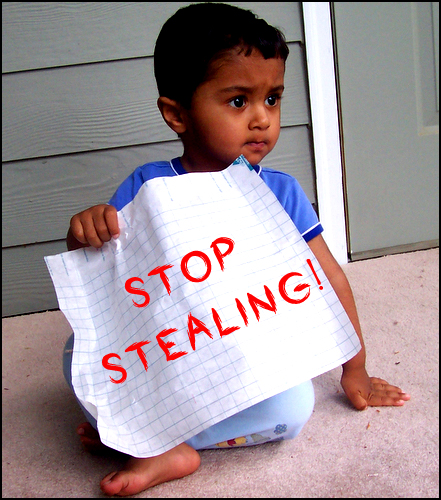A beautiful artist and yoga teacher traveled from San Francisco to guest speak at our yoga teacher training earlier this year.
She delved into the yamas and niyamas, yoga’s ethical and moral guidelines. These guidelines serve as a map of sorts, advising each us how to act in the world and within ourselves.
As a group, we discussed each ethical observation and restraint and how each plays a role in our daily lives. It was when asteya came up, that I was humbled. Asteya is one of the yamas, translating roughly to “non-stealing” from Sanskrit.
At first glance, this restraint seemed boring and irrelevant to my personal practice. This particular restraint is not something I ever thought I needed to keep in check. For me, it’s one of those no-brainers like, “Thou shalt not kill.” The obvious thought that comes to mind when most of us think of asteya is to take another’s property without permission or right, and without intending to return it. We are all familiar with the many obvious examples of stealing.
It was when our teacher suggested, “What about stealing someone’s work?,” that I stopped dead in my tracks and began to feel tears well up in my eyes. We all stared at her blankly for a moment. She did not mean other’s work as in thoughts, ideas, and powerpoint presentations. She meant their work.
The work that all of us as humans have to do in order to evolve and heal throughout our lifetimes. The spiritual and emotional work that we have to choose to pursue if we are going to expand and live a conscious, whole life. I cried, because in that moment I felt myself awaken and I silently whispered to myself, “I steal people’s work.”
I am guilty of doing this with both lovers and friends. Through much heartbreak, I have painfully learned that we cannot do the work for anyone other than ourselves. We can love and support people immensely, yet we cannot do their work for them. When I think of how much effort it takes for me to expand and work on myself, this becomes even more apparent.
Whenever I’ve chosen to take on this endeavor in myself, it is my commitment to my healing and the desperate need to be liberated—from the contraction, the pain—that motivates me. I dive into God, therapy, books, retreats, support groups, astrology, yoga, chanting, energy healing, and a million other modalities. I become determined to find my dharma in the pain and to grow from it.
We simply cannot incite this kind of passion in others to do the same. It must come from within.
Sometimes our advice and support is welcomed by others. Sometimes, we are asked to step in and take over. There will always be a time and a place for this type of support. It is both loving and honorable to hold space for someone who is relentlessly pursuing the path of their healing.
But we have to be very careful that, in doing so, we are not stealing their work. Likely, none of us think of this as stealing. We justify it with quotes from thousands of teachers, books on love and the principles of humanitarianism, or several key pieces from the world’s sacred scriptures. You may justify as you will, but it is stealing.
This work belongs to them and them alone. It is their property. When we try to do this work for them, we are stealing their power from them. We are stealing their opportunities to find their truths and expand on their own, in their own way.
It’s similar to when you tell your children not to do something because you know from experience how painful it is. But the reality is, if they are to develop in the most complete way, they will ultimately have to learn their own lessons regardless.
We all have to stumble, fall, and get bloody sometimes. Growing hurts. Watching the people we love suffer is not a pleasant experience. However, it is here that we witness their contraction before their expansion.
Everything in the universe contracts before it expands. This includes our human existence. We are no different. We cannot be the one to recognize the contraction, or even to stop the contraction from happening for another person. To do so would be a huge disservice toward our loved ones. It is through their journey of doing the work that they will expand.
They have to find their own therapists and their own books.
They have to find their own retreats and their own God.
They have to find what heals them on their own.
When we steal another’s work, we steal these opportunities from them. It, instead, becomes our work. We haven’t done anyone any favors by taking this on, we only stunt their growth and, ironically, bring more pain and contraction into our own lives as a result. It is perhaps a bit egoic and arrogant even.
Who are we to know the divine path and plan for any individual other than ourselves? Who are we to know what lessons they came here to learn and which teachers they are supposed to learn from? Who are we to say how those lessons should look and for how long they should last? Who are we to know their path to salvation?
What if, instead, we set the people we love free? What if we let them go to find their work on their own?
Perhaps this is the most loving thing we can do—allow people to move along their path in whatever way they need and choose to, at their own pace, and in whatever way feels right to them, rather than in the way that we or society impose on them. Perhaps, the most loving act is to surrender our need to save or fix them and allow the Divine to do the heavy work and saving.
Naturally, for some of us, there is going to be a tremendous amount of fear in this surrender. We tend to cling tightly to our ideas of who others are supposed to be and what they should be doing. We are afraid that if we surrender, we might lose them—that they will find another lover, a worse addiction, that they will choose to regress, or decide that they don’t really have destructive tendencies after all.
On the other hand, there’s something beautiful and powerful for all of us collectively when we take accountability of what is ours and what is not. It is deeply empowering when you can give someone back their karma and trust that the Divine will guide them, just as it guides you.
The only thing preventing us from doing this is typically ourselves or, more specifically, our egos. Think of the spaciousness we create in our lives and in our hearts when we surrender our need to steal work from others. All of that energy can go toward fulfilling our own dharma instead.
So, I choose to let go. I choose to surrender. I choose to practice and remain mindful of asteya in an entirely new and unexpected way.
~
Author: Rian Rochelle
Image: Nisha A/Flickr
Editor: Leah Sugerman











Read 0 comments and reply